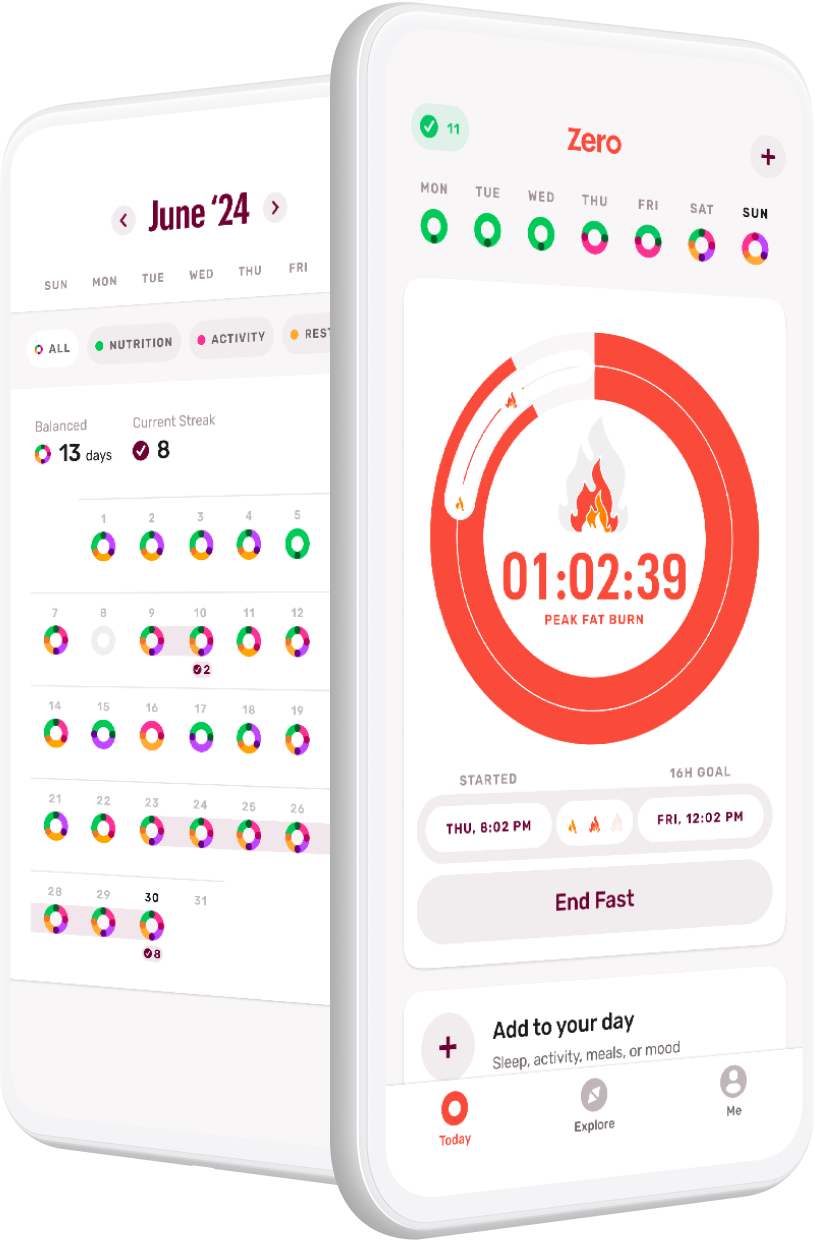Written and medically reviewed by Rich LaFountain, PhD
If you’re trying to achieve a long-term health goal, like maintaining your weight or staying cardiovascularly fit, you know you won’t succeed if every food choice or exercise session is a struggle. That’s why you need to turn these actions into healthy habits!
But forming habits is no easy feat — data from the CDC indicates that less than 7% of adults maintain the top five healthy habits (including sufficient sleep and regular physical activity) for staying healthy and preventing chronic disease. Forming a habit requires, above all else, consistency over time. To stay consistent, you need a combination of motivation and accountability. And one way to achieve those things is by tracking the habit (which, not coincidentally, Zero was designed to do).
How Habits Help You Achieve Your Goals
Making healthy actions repeatable and sustainable means making them semi-automatic so they don’t require as much willpower (or even conscious thought) to perform — i.e., turning them into habits. That neighbor you’ve seen jogging down your block every morning for years? That person isn’t fighting the same inertia you might feel when you go to lace up your sneakers because, for them, their morning run is a habit. Whether it’s running, intermittent fasting, stretching, or going to bed on time, habituation is what makes performing healthy actions repeatedly over the long term possible.
Why Consistency Is the Key to Successful Habit Formation
As your neighborhood jogger demonstrates, an established habit isn’t so hard to maintain. Forming the habit is the hard part. It requires something that every modern, busy person finds challenging: consistency.
In the long run, consistency does not require 100% adherence. In fact, some research suggests that flexible consistency — like meditating most days instead of every day, varying the lengths of your fasts, or getting fast-food takeout one night a week to take a break from cooking healthy meals — is better for maintaining long-lasting health-oriented behaviors than a more rigid approach. However, when it comes to building a brand new habit, a degree of rigidity is often necessary to achieve the consistency required to turn a repeated action into a habit.
Here’s an example: Let’s say you have a goal of prioritizing movement early in your day, before your hectic schedule has a chance to derail your intentions. You may decide to build a habit in which, before having your morning cup of coffee, you complete 25 bodyweight squats. 25 is a good, concrete number, so you’ll know every day whether you have completed the task or fallen short. You’ve also wisely stacked it with a habit you already practice: preparing (and drinking) your daily cup of coffee. Research suggests that you can improve your chances of building this habit by including a cue, so maybe your “start squatting” indicator is turning on the coffee pot. Research also recommends including a positive incentive or reward into the behavior sequence — and in this case, the reward is your beloved coffee!
Eventually, this morning movement habit will become ingrained, at which point you can supplant squats with other activities like taking a walk or working in your yard. However, while you’re building the habit, you need to practice consistency, which means performing those 25 squats every time you switch on the coffee pot. And how do you know if you’re being consistent? By tracking your progress.
Tracking Your Progress and Maintaining Motivation with Streaks
There are numerous ways to track your progress as you form a healthy habit. Some options are made for the task; for instance, Zero is designed to make it easy to record your fasts and your mood and to visualize your progress in other areas like activity and sleep. But you can also track progress with something as basic as scribbling your squat tally on a kitchen calendar. No matter how you choose to do it, research says that tracking and monitoring your progress is necessary for building healthy habits. The record of your habit serves as feedback on how consistent you’ve been, helping you stay accountable and motivated to continue pursuing your goals.
Habit-tracking apps like Zero are especially useful because they can provide reminders and help you celebrate achievements — and enhance your motivation — in fun, unique ways. Awarding badges for challenges or achievements is one method. Highlighting streaks, or the number of consecutive days that you’ve performed a habit, is another.
A recent study suggests that tracking habits and seeing in-app streaks are especially helpful when your habits are in their early formative stages. According to the data, some participants continued tracking and maintaining their streak for over 6 months thanks to the reward and confidence boost they got from visualizing their progress. Similarly, other research has shown that digital tracking and streaks improve self-awareness, accountability, and motivation — all necessary components of building healthy habits.
Streaks with Zero (and What Happens When You Break Them)
Streaks can be a powerful tool for building healthy habits and maintaining consistency — and now you can track your own Fasting Streaks in the Zero Calendar. When you open the Calendar, you’ll be able to see how many consecutive days you’ve fasted — which will help you stay motivated to add “just one more day” to your streak! The longer the streak, the more consistent you’ve been, and the more consistent you are, the more ingrained your fasting habit will become.
Of course, perfection is never the goal. If your streak ends or you have gaps where you went on vacation or leaned into a new habit, that’s okay! Consider those days part of your longevity lifestyle. Because, believe it or not, sometimes ending a streak and taking a short break from your habit is more beneficial than gritting your teeth and muscling through.
Fitness training provides an excellent example. Research demonstrates that you can’t do the same workout over and over again and continue to make gains. The body adapts! Instead, periodized training programs with scheduled breaks allow for greater overall health and performance improvements while reducing your risk of injury or overtraining. Calorie restriction works similarly: Research also shows that when you’re trying to lose weight, intermittent breaks in your diet or lifestyle habits that allow you to strategically splurge or boost your energy intake actually results in losing more fat mass and total body weight than chronic caloric restriction.
Now, you might be worried that breaking a streak means your habit will vanish forever. (If you feel like you have an “all-or-nothing” personality, this is probably you!) Not so fast. If that habit is tied to your identity — as a healthy person, an athlete, a faster, a role model for your kids, a good sleeper, or any number of identities — then you will almost certainly reform the habit and remain consistent over the long term, even if you take a break every now and then.
At the end of the day, consecutive daily streaks are a valuable tool for balancing your health, but they’re not the only tool. Health is multifaceted, and so are you. That’s why forming healthy habits requires consistency, not perfection.
Conclusion
Across your lifespan you will form and re-form numerous habits as your lifestyle morphs and you adjust your habits to fit your needs. Forming habits is rarely fast or easy, but you can make it faster, easier, and more fun with tools like Zero and features like Streaks. Lean into whatever helps you stay consistent and remember: Health — and habits — demand consistency, not perfection.
- Debunking 3 Myths Around Fasting and Thyroid Health - April 15, 2024
- Breaking Down Fast Breakers: How to Tell If Something Will Break Your Fast - March 4, 2024
- GLP-1s and Weight-Loss Medications vs. Lifestyle Interventions: What’s Right for You - February 5, 2024

